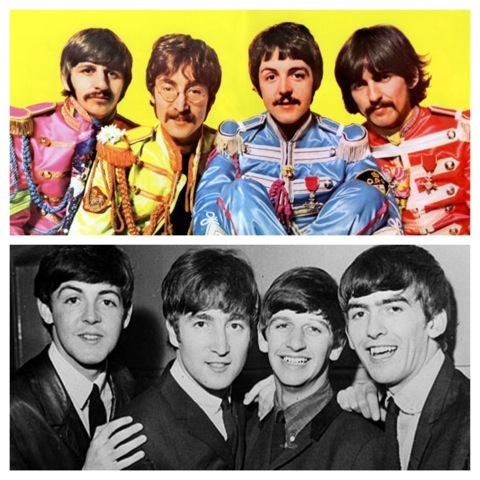Most discussions about art eventually hit the wall of the argument that "taste is subjective". Nevertheless, in terms of pop music, there is near consensus that the Beatles were the greatest and most important band of all time. This post is dedicated to the minority that is still not convinced.
The image above is emblematic. How much time would you think separates the two photographs? Eight, maybe 10 years? No, four! The bottom photograph is from 1963 and the top one from 1967. But the group's exponential evolution of course goes way beyond looks. The immense and diverse musical production of the Beatles all occurred within a period of less than 10 years. The first album, Please Please Me, is from 1963, the last Let It Be, from 1970. In this incredibly short period, they composed numerous treasures in an increasing level of sophistication, innovation and versatility, and in a way that hasn't been replicated by any other band.
To illustrate it, the following songs were recorded, album after album, from 1963 until 1970 (those who don't know them should check them out, preferably in order): "Love Me Do", "It Won't Be Long", "And I love Her", "Help", "In My Life", "We Can Work It Out", "Eleanor Rigby", "A Day in the Life", "All You Need is Love", "I Am the Walrus", "Dear Prudence", "I Want You", "Come Together", "Across the Universe". It's amazing to note how diverse in style these songs are, as well as the degree of evolution, not necessarily in terms of quality (after all each phase has its own merit), but in terms of richness and musical maturity. Who would say the same band recorded "A Day in the Life" and "Love Me Do", especially only four years apart?
To better understand the magnitude of this progress, it is interesting to look at other great bands. The Rolling Stones, amazing as they are, have evolved relatively little in their 50 years (!) of existence. Listening to a Stones album from the 1990s is not so different from a record from the 1970s or even 1960s. The Beatles were together for less than a third of the time of bands such as Pink Floyd, U2 and Pearl Jam, which, despite their merits, have been producing (or produced) music within well-defined styles and without major lateral progress. The Beatles' unique vividness and versatility explain why their music is timeless and considered modern to this day. Elders and their grandchildren listen to "Here Comes the Sun" with the same enthusiasm.
The Fab Four experimented and innovated like no other group. They dared with complex harmonies when others played only a handful of chords; synchronized vocals in a pioneering fashion; created novel arrangements and introduced new instruments; played from rock n' roll to blues, ballads, folk, progressive, hard rock, psychedelic and songs that are even difficult to label; were original with their lyrics, studio work, videos, and attitude. They planted seeds that continue to germinate. For this reason they are the band most played by other greats: Jimi Hendrix recorded "Day Tripper" and "Sgt Peppers"; U2, "Helter Skelter"; David Bowie, "Across The Universe"; Elton John, "Lucy In the Sky With Diamonds"; Steve Wonder, "We Can Work It Out"; Eric Clapton, "While My Guitar Gently Weeps"; among many others. Several current bands, like Radiohead and Oasis, openly admit being inspired by them.
Indeed, taste is subjective. It is perfectly acceptable that someone prefers The Who, Metallica or Britney Spears to the Beatles. However, being as objective as one can be in the field of the arts, I hope to have made the minority that doesn't appreciate the Beatles at least rethink it a bit.

